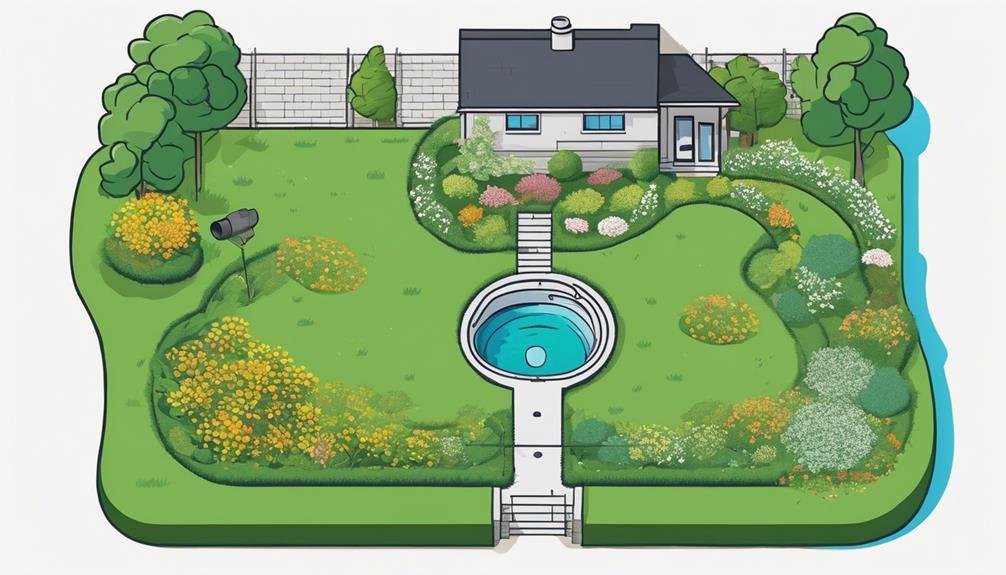If you've never dealt with a septic tank before, the idea of checking if it's full may seem daunting. However, understanding the signs can save you from potential issues down the line.
Imagine having peace of mind knowing how to prevent costly repairs and inconvenient backups in your home. By paying attention to subtle cues, you can detect when your septic tank needs attention.
Key Takeaways
- Slow drainage, foul odors, gurgling sounds signal a full septic tank.
- Soggy ground, lush greenery above the drainfield indicate issues.
- Regular inspection, pumping, and maintenance are critical.
- Mindful flushing, proper soil composition help prevent septic tank problems.
Signs of Slow Draining Fixtures

If you notice water taking longer than usual to drain from sinks, showers, or toilets in your home, these are clear indications of slow draining fixtures that could signal a full septic tank. Slow drainage occurs because the septic tank is reaching its capacity, causing water to pool in your sinks or showers. Additionally, soggy ground around the septic tank area or leach field is another sign of a full septic tank. The excess water from the full tank has nowhere to go, leading to the ground becoming saturated and soggy.
To address this issue, it's crucial to inspect the septic tank for levels of waste. Pumping the tank is the most effective solution to prevent any further damage to your septic system. By pumping the tank, you remove the excess waste and allow the system to function properly again. Regular maintenance and monitoring of your septic tank can help prevent slow drainage issues and ensure the longevity of your system.
Foul Odors Around the Property
Experiencing foul odors around your property can be a telltale sign that your septic tank is full and in need of attention. When a septic tank reaches full capacity, it can release gases that produce unpleasant smells, indicating that the system isn't functioning properly. To address this issue, prompt septic tank maintenance is crucial. Neglecting maintenance can lead to more severe problems such as backups and potential damage to your property.
The foul odors emanating from your property could also be a result of the composition of the soil surrounding your septic tank. Soil composition plays a significant role in the absorption and filtration of effluent from the septic system. If the soil is saturated or compacted, it may not effectively filter out impurities, leading to odors lingering around your property.
Regular septic tank maintenance, including pumping when necessary, and ensuring the proper soil composition around the tank can help mitigate foul odors and maintain the efficient operation of your septic system.
Lush Greenery Over the Drainfield

Wondering why lush greenery is thriving above your drainfield? Healthy soil and proper maintenance are key factors influencing the vegetation growth in this area.
When your septic system is functioning optimally, it releases treated water into the drainfield, providing essential nutrients for plant growth. The presence of vibrant green plants above the drainfield indicates that the soil is receiving adequate moisture and nutrients from the wastewater.
To maintain the lush greenery over your drainfield, it's crucial to ensure that your septic tank isn't full or experiencing any issues. Regular inspection and pumping of the septic tank are necessary to prevent overflows that could harm the soil and plant life above.
Proper maintenance of your septic system won't only support healthy soil and greenery but also extend the lifespan of your system.
Gurgling Sounds in the Plumbing
To determine if your septic tank is full, pay attention to any gurgling sounds coming from your plumbing system. Gurgling noises can indicate that your septic tank is reaching its capacity and needs immediate attention. When your septic tank is full, it can cause a backup of wastewater into your home, leading to unpleasant odors and potential health hazards.
Maintenance tips for avoiding gurgling sounds in your plumbing include regular septic tank inspections by a professional. Schedule routine pumping every 3-5 years to prevent the tank from becoming overloaded with solid waste. Be mindful of what you flush down your drains to avoid clogs and buildup in the septic system. Additionally, consider installing a filter on your washing machine to prevent lint and debris from entering the septic tank, reducing the risk of blockages and gurgling sounds.
Conclusion
So, if you notice slow draining fixtures, foul odors, lush greenery, or gurgling sounds in your plumbing, it may be a sign that your septic tank is full. Just like a ticking time bomb, a full septic tank can cause major problems if not addressed promptly.
Keep an eye out for these warning signs and make sure to schedule regular maintenance to prevent any potential disasters.

